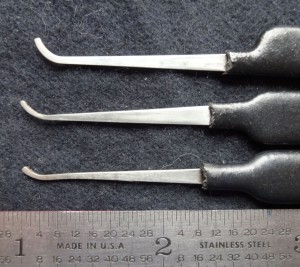Up until this point most of your experience is with padlocks, probably Master locks. In your career you’ll encounter locks from many different manufacturers like Arrow, Best, Brinks, Defiant, Dexter, Medeco, Falcon, Sargent, Keso, and others. Most will be either mortise cylinder or key-in-knob formats, with the occasional small format interchangeable (SFIC) or Large Format Interchangeable (LFIC) locks. Very little of your work will actually be on padlocks, although they are fun and easy to hold in your hand while picking. This brings us to the next item: your vise.
Like a dumbass I kept replacing broken crappy vises with another crappy vise instead of doing a little research and trying to find a reputable manufacturer.
Yes, it’s possible to pick locks using just your hands, but it’s tiresome and awkward. A vise simulates the lock mounted in a doorway, stabilizes the lock, and makes assembly and disassembly easier. Most lock picking vises were intended for other things: model building, soldering, or fly-tying and have either a solid, heavy base, or a suction cup mount. Over the years I tried several different Chinese-made vises I bought from eBay. All were mistakes and failed in some way – they didn’t hold the lock reliably, the mechanism broke easily, or the suction cup dry rotted withing a month. Like a dumbass I kept replacing broken crappy vises with another crappy vise instead of doing a little research and trying to find a reputable manufacturer. Four years ago my vise failed during a video and a viewer recommended I replace it with a Panavise. In my research I noticed the price was roughly TWICE what I had been paying for the Chinese junk, but the vise came with a lifetime guarantee so I ordered a model 350 and have never looked back. My Panavise has a solid base, is infinitely adjustable for any angle, and has wide, hard gripping jaws. In four years it has never failed once. I don’t own the Panavise company and don’t even get a kickback, but recommend them highly. You can buy direct from them at panavise.com.
There are lots of places to get locks very cheaply or maybe even free. Visit your local locksmith, explain you’re taking a lock picking course and ask if you can buy their take-offs. Most locksmiths keep the hardware they remove from jobs and sell it as scrap metal because most of it is brass. If you seem “normal”, knowledgeable about locks and offer to BUY the locks instead of ask for it for FREE, you might hit a gold mine. In my case I visit my local locksmith about once a month and bring along a pizza. I call a few days beforehand to make sure the owner will be there and he always sets aside some nice stuff for me. Once I mentioned I was thinking about experimenting with a Medeco bump key and the next month he had a box containing about 200 keys and 11 take-off cylinders from a commercial building! All for a pizza.

Another place to look are the renovation stores that sell recycled building materials. Again, mention that you are a lock collector and don’t care about getting keys. Be friendly and the staff will often set aside locks for you. My Restore manager puts all locks that come into the store under the counter for me. When I pay, I often leave $10 or $20 in the tip jar. Once he set aside a complete case of 48 brand new, never installed 6-pin Schlage commercial locks for me – complete with keys! How much? $1 each! Not bad for just being friendly.
If you can’t get locks any other way, check out eBay for “Lock Lots”, or “Mortise Cylinder Lots”. You’ll find many sellers with groups of 20 or more locks selling for under $20 plus shipping.
Your objective isn’t to accumulate every lock on Earth. Instead, just one or two locks from each of the major manufacturers should be enough. At a minimum try to get Kwikset, Schlage, Yale and Sargent mortise cylinders. In Europe you are looking for Abus, Zeiss-Ikon, Winkhaus, and Wilka Euro cylinders. In the UK try to find ERA, Yale, UAP, Union, GeGe and Legge Euro cylinders. If you live somewhere else, ask a local locksmith what the most popular locks are in your area.
I once spent an entire weekend trying to escape from one of those Mila trap pins!
Once you’ve collected and picked a few different brands of locks you’ll probably notice they all have different “personalities” that you’ll need to adapt to. Some like heavy tension, while others seize up with it. Most will contain security pins – almost always spools. You’ll find that each type of spool behaves differently depending on it’s length and the depth of the cut in the spool. Deeper cuts generally result in deeper false sets that are more difficult to get out of without resetting several other pins. Long, shallow spools have reduced feedback and are more difficult to detect. Short, shallow spools can be the most difficult of all, often behaving like serrated pins.
Commercial locks often contain “tricks”, like counter-milling or oddly shaped proprietary pins. The German lock manufacturers are REALLY bad about this, and that’s what makes the German locks so desirable and fun to pick. A few locks even contain “traps” for pickers, like the infamous Mila cylinder. I once spent an entire weekend trying to escape from one of those Mila trap pins! My point here is that every lock contains lessons for you to learn and absorb. No online lock course can prepare you for every contingency, so you need to go out, acquire a variety of locks, and experiment with them – stashing the lessons into your own bag of tricks.
As you expand your skills into the advanced, high security locks you should consider an addition to your pick set.
In North America your choices are somewhat limited. Most homes have either Kwikset or Schlages on them. Neither of those are particularly good locks, but we have what we have. Kwiksets are junk and will not challenge you at all. Schlages have a somewhat paracentric keyway and their quality is quite a bit better. Still, few locks in N. America contain security pins, although this seems to be changing. I recently found out that Kwikset is putting spool pins into some of their locks – a welcome upgrade! One thing we DO have in N. America are the SFIC and LFIC locks. These are multi-shearline locks that can be quite challenging (and frustrating) to pick open. Many of them now have security pins and paracentric keyways, making them a lot of fun to pick.

As you expand your skills into the advanced, high security locks you should consider an addition to your pick set. The German LockSport Organization, SSDev designed a trio of hooks specifically designed to defeat deep cut, paracentric keyways. At present, Sparrows Lockpicks is the only company licensed to sell them but at $14.50 for the complete SSDev Set it seems very reasonable.
All right! Time to move on to LP302!